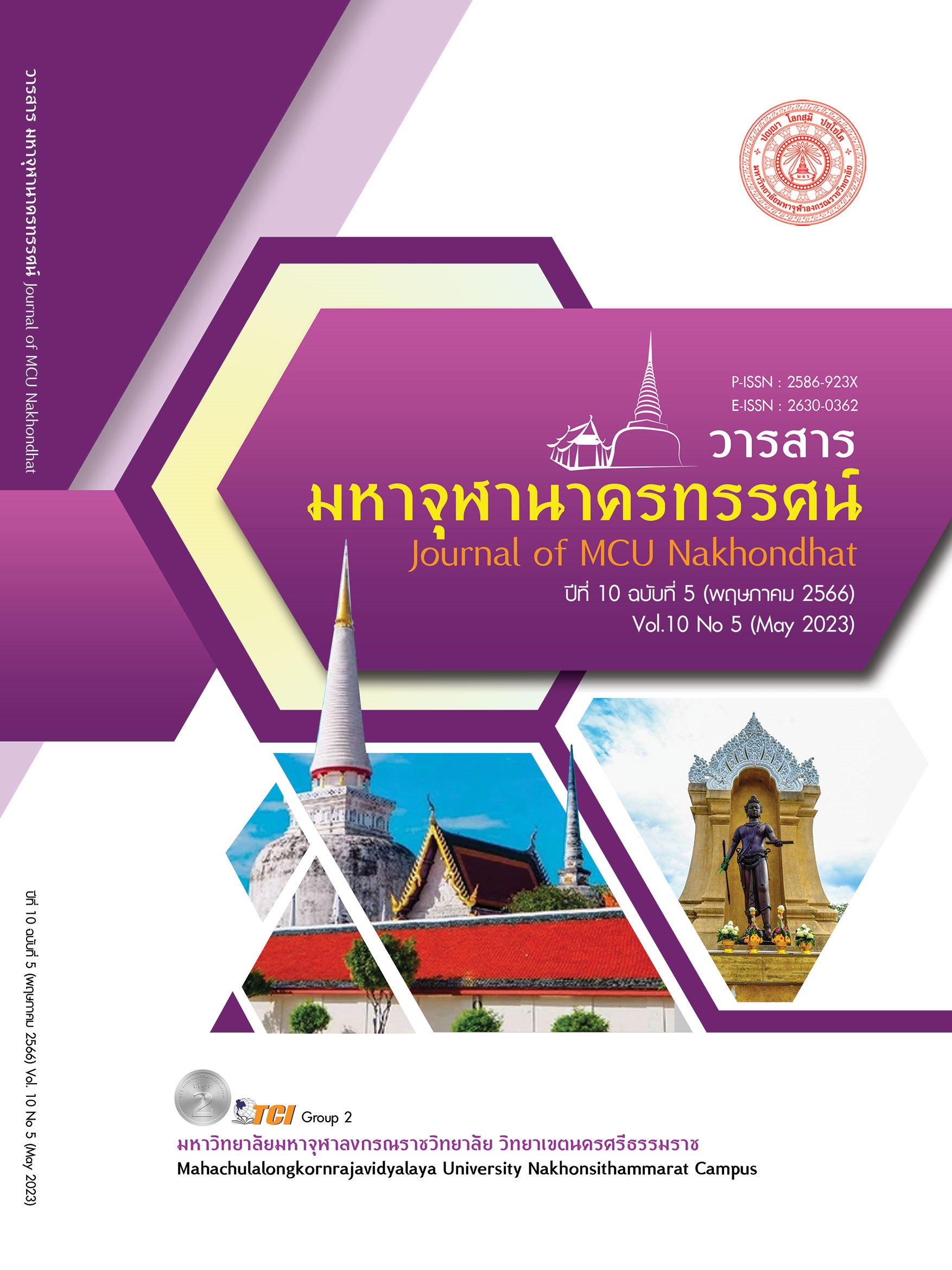LOKAVAJJA AND BUDDHIST MONKS’ SAMAṆASĀRUPPA DEVELOPMENT
Main Article Content
Abstract
This research paper aims to: 1) study the concept of Lokavajja in Theravada Buddhism, and 2) present considerations before proceeding to criticize Buddhist monks. This study is Documentary Research. Its main focuses are on collecting and analyzing the data obtained from primary and secondary documents which relate to Lokavajja. The study found that the concept of Lokavajja in Theravada Buddhism, the term “Lokavajja” is composed of 2 implications: Worldly Fault and Action Blamable by the Layman. The former is to consider the laws and social rules that are clearly enacted and thus can be easily used to consider the actions of Buddhist monks. On the other hand, the latter can be complicated to be considered. This might be because each person may consider a Buddhist monks’ action variously owing to employing his or her own criteria, criticizing them with prejudice and bad volitions. Therefore, those remarks are not truly helpful for the Buddhist monks’ samaṇasāruppa development. However, in the Buddha era, the Buddha used criticism to improve the Buddhist monks’ samaṇasāruppa and he had attached great importance to public reproach. In addition, the study also found that a truly useful reprimand for the Buddhist monks’ samaṇasāruppa development is composed of 5 elements as follows: 1) the censure corresponds to the facts, 2) the blamer has an intensive knowledge of precepts and practical traditions of Buddhist monks, 3) the blamer knows the basic criteria for considering of the Buddhist monks’ samaṇasāruppa, 4) the blamer has good intentions and does not prejudice towards the Buddhist monks, and 5) the method of censure must not cause the blamer to sin.
Article Details

This work is licensed under a Creative Commons Attribution-NonCommercial-NoDerivatives 4.0 International License.
References
เจษฎา บัวบาล. (2560). โลกวัชชะ: ใครคือผู้กำหนดพฤติกรรมที่เหมาะสมของพระ? เรียกใช้เมื่อ 11 มีนาคม 2566 จาก https://prachatai.com/journal/2017/11/73914
กิเลน ประลองเชิง. (2564). โทษของโลกวัชชะ. เรียกใช้เมื่อ 11 มีนาคม 2566 จาก https://www.thairath.co.th/news/local/2184430
คณาจารย์โรงพิมพ์เลี่ยงเชียง. (2550). วินัยมุข เล่ม 1 ฉบับมาตรฐาน. กรุงเทพมหานคร: โรงพิมพ์เลี่ยงเชียง.
ทองย้อย แสงสินชัย. (2560). บาลีวันละคำ. เรียกใช้เมื่อ 19 มกราคม 2565 จาก https://www.facebook.com/315075048690020/posts/d41d8cd9/683336935197161/
พระธรรมกิตติวงศ์ (ทองดี สุรเตโช ป.ธ.9). (2551). พจนานุกรมเพื่อการศึกษาพุทธศาสน์คำวัด. (พิมพ์ครั้งที่ 3) . กรุงเทพมหานคร: ธรรมสภาและสถาบันบันลือธรรม.
พระมหาบุญโฮม ปริปุณฺณสีโล (ไชยฤทธิ์). (2559). “ปัณณัตติวัชชะ และโลกวัชชะ คำที่คนไทยยัง เข้าใจผิด.”. เรียกใช้เมื่อ 21 มีนาคม 2565 จาก http://www.mahabunhome.com/lokavatcha.html
มหามกุฏราชวิทยาลัย. (2534). พระไตรปิฎกพร้อมอรรถกถาแปล ชุด 91 เล่ม. กรุงเทพมหานคร: โรงพิมพ์ มหามกุฏราชวิทยาลัย.
สถาบันนิติธรรมาลัย. (2565). ส่วนที่ 1 โทษ (มาตรา 18-38). เรียกใช้เมื่อ 24 สิงหาคม 2565 จาก https://www.drthawip.com/criminalcode/1-7
สมเด็จพระพุทธโฆษาจารย์ (ป. อ. ปยุตฺโต). (2559). พจนานุกรมพุทธศาสน์ ฉบับประมวลศัพท์. (พิมพ์ครั้งที่ 27). กรุงเทพมหานคร: โรงพิมพ์พระพุทธศาสนาของธรรมสภา.
สำนักงานราชบัณฑิต. (2556). พจนานุกรม ฉบับราชบัณฑิตยสถาน พ.ศ. 2554. (พิมพ์ครั้งที่ 2). กรุงเทพมหานคร: อบริษัท นานมีบุ๊คส์พับลิเคชั่นส์ จำกัด.
สุจินต์ บริหารวนเขตต์. (2562). พระช่วยน้ำท่วม คนเข้าใจผิด บวชทำไม นับถือพุทธทำไม. เรียกใช้เมื่อ 11 พฤษภาคม 2565 จาก https://www.youtube.com/watch?v=YtQj5CBN8pk
Jitrarut P. (2565). โดนกดดันหนัก ‘พระ’ ตั้งวงกระดกเหล้ากับชาวบ้านในวัด ยอมสึกแล้ว หลังอ้างดื่ม ฆ่าโควิด. เรียกใช้เมื่อ 28 กรกฎาคม 2565 จาก https://ch3plus.com/news/social/ch3onlinenews/290141
Nation Online. (2565). สรุปดราม่า “พระอาจารย์แจ้” พร้อมทำความรู้จักคือใคร ? เรียกใช้เมื่อ 24 สิงหาคม 2565 จาก https://www.nationtv.tv/news/378877352


